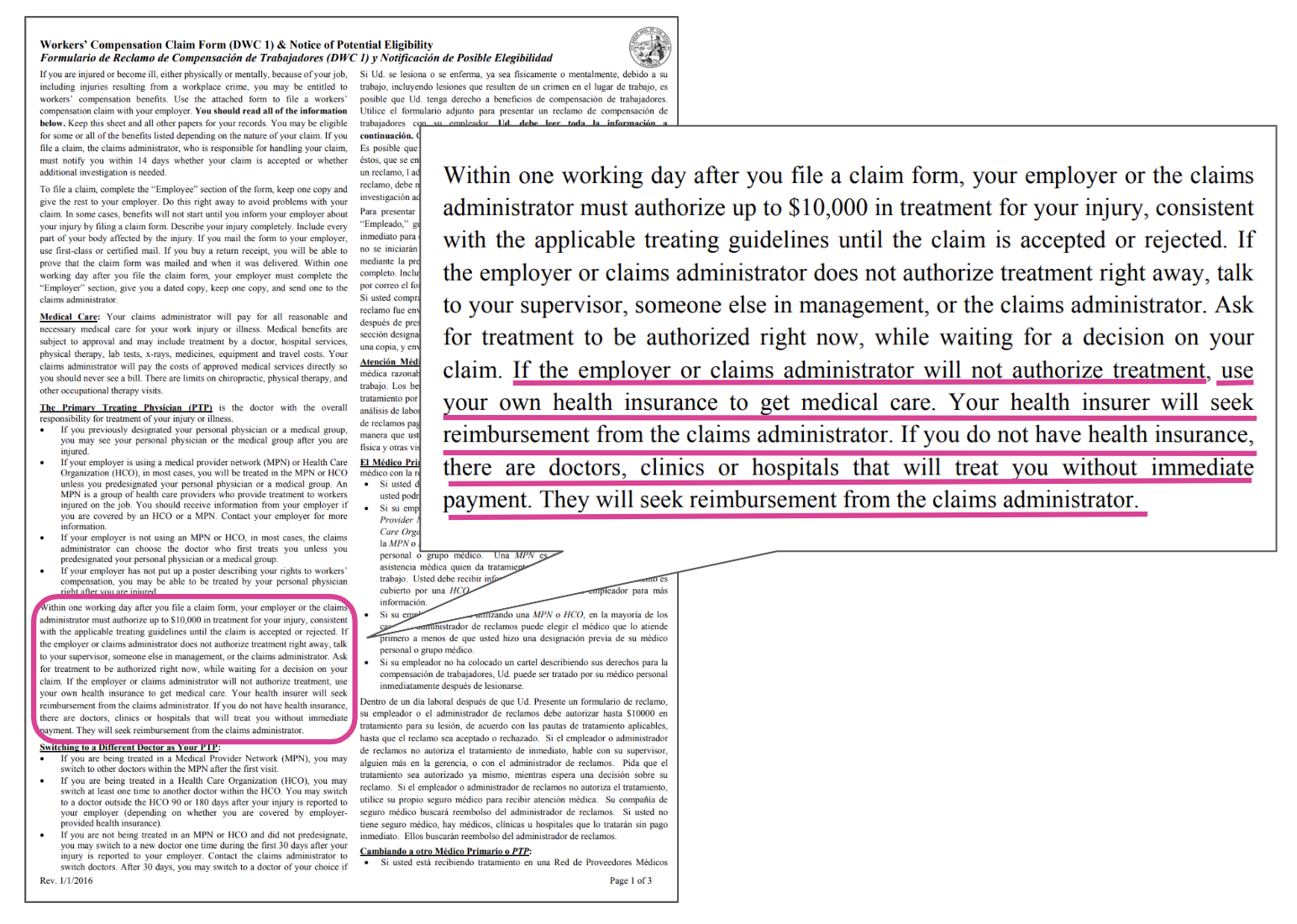California DWC - Division of Wretched Compensation

Immediately after an employee reports a work-related injury, the employer’s claims administrator is allotted up to 90 days to accept or reject liability for the reported injury. California law mandates authorization and payment of up to $10,000 of medical treatment during the 90 days allotted to accept or reject liability.
But in direct contradiction to California law, the California Division of Workers’ Compensation (DWC) publishes instructions that allow claim adjusters to defer or postpone medical care authorization (and the $10,000 payment) during the 90 days allowed for an employer to accept or reject liability of an injury.
How can a newly injured worker obtain and afford necessary care within the allocated 90-day period, considering that care may not be authorized due to the DWC's allowance for claims adjusters to defer medical treatment authorization?
Injured workers can find the answer in the DWC 1 form that newly injured workers must file with their employers. This form (issued by the DWC ) instructs newly injured workers to obtain medical care by either using their “own health insurance” or seeking free medical care (this ignoble directive is also endorsed by the Department of Industrial Relations (DIR) Guidebook for Injured Workers).
In a troubling divergence from established state law designed to protect injured workers, the DWC permits claims administrators to sidestep their legal obligations, forcing injured workers to resort to potentially fraudulent use of personal insurance or to seek free care. This injured workers’ plight highlights the systemic flaws in California's workers' compensation system.
CA Law: Payment Owed for Treatment Before Liability Decision
Labor Code Section 4610 demands that employers “review and approve, modify, or deny” all medical treatment requests for an injured worker. Further, the California Supreme Court held that this employer review must be used for every medical treatment in California workers' compensation.
Since California law allows an employer the right to review all medical treatment, the California legislature also enacted two reasonable laws meant to protect newly injured workers during the 90 days allotted to an employer to accept or reject liability of an injury.
Reasonable Law Number 1: Labor Code Section 5402 law demands that the employer shall authorize and pay for the worker’s care, no matter what the claims administrator ultimately decides:
Within one working day after an employee files a claim form under Section 5401, the employer shall authorize the provision of all treatment [emphasis added], consistent with Section 5307.27, for the alleged injury and shall continue to provide the treatment until the date that liability for the claim is accepted or rejected. Until the date the claim is accepted or rejected, liability for medical treatment shall be limited to ten thousand dollars ($10,000).
Reasonable Law Number 2: Labor Code Section 4610.3 instructs once an employer authorizes medical treatment, that authorization cannot be undone, even if the employer later determines that the physician was not eligible (read: not in the applicable MPN)
“[A]n employer that authorizes medical treatment shall not rescind or modify that authorization after the medical treatment has been provided based on that authorization for any reason, including, but not limited to, the employer’s subsequent determination that the physician who treated the employee was not eligible to treat that injured employee.”[1]
These two laws stipulate that if an employer needs 90 days to determine liability
- The employer must authorize all medically necessary care, and
- Authorization of care is a guarantee of payment for that care
Unfortunately for injured workers, the DWC has promulgated underground rules that directly contradict the intent of these practical and logical laws meant to protect newly injured workers.
DWC FAQ: Claims Admin May Defer Authorization
Despite the laws above, the DWC website’s FAQ page on Utilization Review (UR) instructs claims administrators that when liability for an injury is disputed, the claims administrator may respond to a provider’s Request for Authorization (RFA) by deferring UR as long as liability is disputed:
Q. Can a claims adjuster defer a utilization review decision?
A. Yes. A claims adjuster may defer (or postpone) a utilization review decision of an RFA if the claims administrator disputes liability [emphasis added] for the occupational injury for which the treatment is recommended or disputes liability of the recommended treatment itself for reasons other than medical necessity. Within five (5) days from receipt of the RFA, a claims adjuster may issue a written decision deferring utilization review of the requested treatment and send it to the requesting physician, the injured worker, and if the injured worker is represented by counsel, the injured workers' attorney…
How does an injured worker obtain care if the DWC allows claims adjusters to postpone medical treatment authorization? The Division of Wretched Compensation proposes two absurd solutions and exposes the DWC as either naive or willfully ignorant. According to the DWC 1 form:
- If an injured worker uses their health insurance to pay for their medical care (and ignores the specter of insurance fraud), the health insurer will “seek reimbursement from the claims administrator.” This is FALSE. The reality is that upon learning about the potential insurance fraud, the health insurer will immediately claw back any payments made to the physician for treating the injured worker.
- For injured workers that do not have health insurance, the DWC advises that there are doctors, clinics, or hospitals that will treat the injured without payment. These entities can “seek reimbursement from the claims administrators.” This, again, is entirely unrealistic. If a doctor treats without a UR decision approving the treatment, the California Supreme Court allows the claims administrator to deny payment for lack of authorization.
Finally, when a claims administrator delays its liability decision and denies authorization for treatment, the DWC 1 form instructs injured workers to:
- “Ask for treatment to be authorized right now, while waiting for a decision on your claim.”
Why should the injured worker “ask” the claims administrator to follow the law? Why doesn’t the DWC just…enforce the law? Because deferring authorization is allowed (and endorsed) by the DWC underground rules
The DWC has made California an incredibly fraught state to sustain a work-related injury. While the law protects newly injured workers, the DWC’s parallel universe of rules defies these protective laws; injured workers are instructed to pay or beg for medical treatment while an employer spends up to three months contemplating liability. This is a wretched system.
daisyBill software, data, and expertise make billing easier, faster, and less costly. Request a free demonstration below.
REQUEST DEMO
DaisyBill provides content as an insightful service to its readers and clients. It does not offer legal advice and cannot guarantee the accuracy or suitability of its content for a particular purpose.








I read your article and you know I was turned away by my doctor when I injured my back at work and the employer wouldn't step up and take responsibility for it. When the doctor's office asked how I injured my back and I said I did it at work, they said, sorry we can't see you you have to go through your employer. It delayed medical treatment for weeks and only added to my injury by not being able to get help right away!!! This is surely a messed up system!!!!
Who can intervene? The insurance commissioner? A state senator? The governor? Should we involve news outlets? It is just SO BLATANT!!!! and so damaging and so unethical.